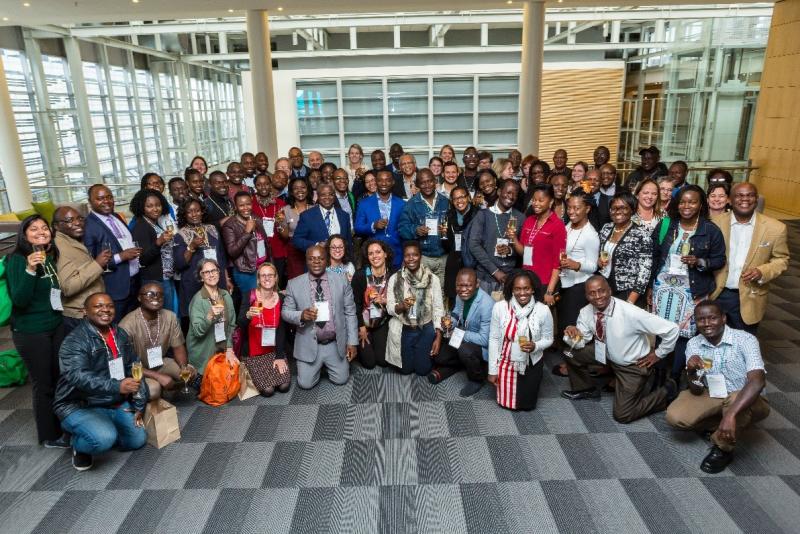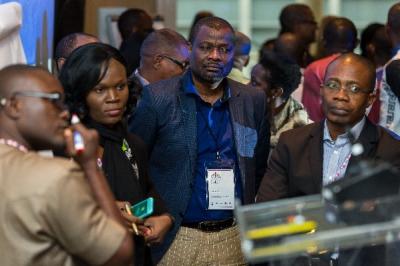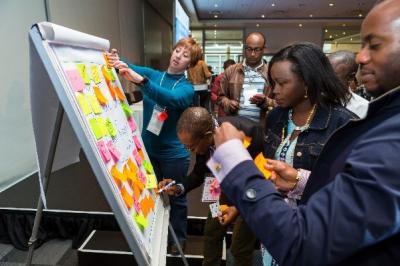
Report on the launch of Cochrane Africa at the Global Evidence Summit
15 September 2017, Cape Town International Convention Centre

AFRICA – Access, Funding, Relevance, Individuals, Coaching/capacity development and A community
Background – Taryn Young
Taryn sketched the development of the network upon the foundation laid by Cochrane South Africa, founded in 1997. Highlights included the launch of the HIV Mentoring Programme in 2000; the establishment of the Reviews for Africa Programme (RAP) in 2005 which focused on the conduct of reviews relevant for the Africa region; the work of the DFID funded Effective Health Care Research Consortium since 2006; the first African Cochrane Contributors meeting in 2007 where CAN was first discussed; the launch of the Pan African Clinical Trials Registry and the STEPP project; and the 2013 Africa Cochrane Indaba which furthered discussions on CAN and strengthen relationships. At this event in 2013 delegates put forward various needs to advance the network – summarised in the acronym AFRICA -- Access, Funding, striving for Relevance, receiving Coaching / Capacity development and working as A community.
Building a network - we want to go together and to go the farthest we can
Structure and governance – Solange Durão
Solange outlined the CAN governance structure, which consists of three regional hubs and a central co-ordinating unit. She outlined the priorities of Cochrane Africa as detailed in the five-year strategy including: the identification of priorities, gaps and author teams; mentorship and fellowships to support review production; the importance of translation of evidence into regional languages; partnerships with stakeholders; raising awareness about evidence-based health care and building capacity of all stakeholders to use reviews to inform healthcare decision-making in the continent; and, the importance of securing multiple funding to ensure the network’s sustainability. She highlighted the guiding principles of the network, including the uniqueness of each country, prioritising to ensure relevance; collaborating; taking one step at a time; avoiding duplication; and building sustainability. Going forward, the aim is to expand the network, bringing in new collaborators and countries, and to continue to work together toward the aim of increasing the use of evidence to inform healthcare decision making in Africa. To illustrate this she ended with the words of an African proverb that states that “if you want to go fast, go alone, but if you want to go far, go together”.


Taking the Cochrane Africa Network forward
Tamara Kredo
Tamara closed the session by asking the audience to answer, via flipcharts and rapporteurs, the following questions:
• Where are you from?
• What are you doing already?
• What should we do? And, How do you want to get involved?
Where are you from?
Participants at the launch were from the following 17 countries: Australia, Belgium, Brazil, Cameroon, Canada, Congo, Ethiopia, Italy, Kenya, Mozambique, Mauritius, Nigeria, Scotland, Swaziland, The Gambia, Uganda, and South Africa.
What should we do? And, How do you want to get involved?
The following themes were highlighted by three groups:
• Expansion - more local hubs, more young scientists/people, more search co-ordinators.
• Translation – the need to expand language translation efforts (including podcasts).
• Enhanced consumer involvement and end-user engagement by building consumer networks, accessing patients and support groups, and improving access and acquiring information for evidence users.
• Increased funding.
• The need for enhanced branding activities.
• More networking and collaboration including the development of a skills database and increased information sharing about projects.
• Increased capacity building - capacity and awareness building in academia, policy settings and media, students, policy makers/leaders, politicians, ministries of health and multi-sectoral engagement (e.g. finance ministries); mentorship of both individuals and institutions.
• Enhanced roles for Africans - more editorial roles, more involvement in methods development for Africa (Africans in methods group).
• Enhanced review production through prioritising relevant reviews; increased editorial skills, leading collaborative review groups, translational and user-friendly reviews.
• Guidelines development – co-ordinated in-country and regionally, and enhanced knowledge translation for guidelines and policies.
• Facilitating implementation in practice settings and the translation of evidence into policy.
Acknowledgements
CAN gratefully acknowledges the contributions of funders to CAN projects. Cochrane Africa is partly supported by the Effective Health Care Research Consortium. This Consortium is funded by UK aid from the UK Government for the benefit of developing countries (Grant: 5242). The views expressed in this document do not necessarily reflect UK government policy. We are also partly supported through the Cochrane Regional Initiatives funding.


